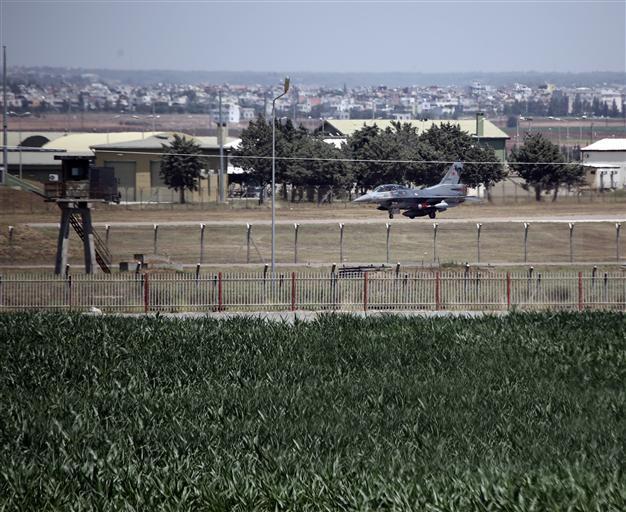Turkey to become the main base in anti-ISIL fight
Serkan DEMİRTAŞ
 The implementation of a deal between Turkey and the United States in the fight against the Islamic State of Iraq and the Levant (ISIL) has already started, as armed drones from İncirlik air base hit jihadist troops earlier this week. The next step will be the deployment of U.S. warplanes to İncirlik, from where they will conduct aerial strikes against ISIL.
The implementation of a deal between Turkey and the United States in the fight against the Islamic State of Iraq and the Levant (ISIL) has already started, as armed drones from İncirlik air base hit jihadist troops earlier this week. The next step will be the deployment of U.S. warplanes to İncirlik, from where they will conduct aerial strikes against ISIL. As a Western diplomat said, the Turkish base will host a substantial number of aircraft and this number will grow in time. U.S. warplanes will be accompanied by aircraft from some other coalition members as well as Turkish ones that will actively participate in the military campaign.
The diplomat said the operations from İncirlik will start very soon and Turkey will join its NATO ally after the completion of military technical works to provide the best coordination between the two.
Turkey’s offer of the use of its other military facilities to coalition countries is also on the table, as Turkish and American military experts are examining how best they could be used. Turkey has three important facilities in areas near the Syrian border: namely air bases in Diyarbakır, Malatya and Batman. These facilities are planned to be used for non-combat objectives and as logistic hubs for the coalition members.
Therefore in a few months’ time we’ll observe very openly the usage of these facilities with greater frequency, particularly İncirlik as the main launching pad for the coalition members’ attack on ISIL targets in Syria and Iraq. The U.S. and other important coalition members, like France and the United Kingdom, are mainly using bases around the Gulf region or their aircraft carriers in the Persian Gulf in their attacks on ISIL.
Given Turkey’s geographical advantages and proximity to ISIL’s important positions in Iraq and Syria, it’s very likely the center of gravity in the ISIL fight will be repositioned to Turkey. It’s very consistent when considering that the objective of the fight against ISIL is to degrade and defeat it, as diplomats put it. A military campaign carried out by important NATO allies under U.S. leadership from a NATO country’s NATO-standard military facilities would of course make a difference in the battlefield.
It is necessary to repeat how a Western diplomat characterized the potential impact of Turkey joining the fight and opening its bases and airspace to the coalition countries to the anti-ISIL fight: “Obviously Turkey’s geography and the proximity of a number of its military facilities along the border to the areas of conflict will enable us to apply additional military pressure on Daesh [ISIL], and to do so with greater frequency and greater intensity. And we think that will have an important qualitative difference in our ability to put additional military pressure on Daesh.”
İncirlik main launching pad
Pushing ISIL off the Turkish border to create an ISIL-free zone in the areas between Azaz and Jarablus is also among the top objectives of the Turkish-American deal, an effort requiring the active fighting of Syrian local forces, including the Syrian Kurds’ Democratic Union Party (PYD) and Free Syrian Army (FSA). This would turn Turkey’s around 100-kilometer-long border with Syria into one of the major battlefields of a war between local forces and ISIL militants.
The Western diplomat made it clear the Turkish and American militaries are working on finding the best and most efficient ways to support local forces, obviously the Free Syrian Army (FSA) and PYD forces. This would put additional importance on Turkey actively joining the coalition, although it would take some time before it yields concrete results.
That’s why diplomats have underlined the success of this partnership between Turkey and the U.S. should rather be observed over a long time period, as this war won’t be won overnight. The train-and-equip program will also continue despite the difficulties, as Turkey and the U.S. continue to seek ways to improve it.
As seen, Turkish full participation in the coalition will turn its territories into the main base in the ISIL fight. Its Incirlik base will become the main launching pad for the coalition’s aerial campaign while its other bases will serve as logistic hubs. The train-and-equip program to be carried out on Turkish soil will let Turkey serve as one of the main training camps in which more moderate rebels would be trained and sent to Syria to fight ISIL.
‘However long that takes…’
There are two other details that prove Turkey’s growing role in the ISIL fight. The first is the fact that written documents signed as part of this mutual understanding between Turkey and the U.S. to deepen coordination and cooperation against ISIL are suggesting a comprehensive framework and are seen subject to be updated in line with developments. Considering that this fight could take years, the nature and the scope of these agreements will prove their importance as the fight intensifies against ISIL.
The second is about the understanding itself. The Western diplomat described this understanding as one of the key pillars of the agreements between these two countries:
“As part of the discussions that produced this agreement to deepen cooperation between the two countries, there is recognition in both governments that we need to work together to achieve the result however long that takes. There is a realization and understanding in both governments that this would take some time, persistence and focus.”
This signals a real long-term war on terror to be carried out from Turkish territories into neighboring Syria for, as the diplomat put it, “however long it takes.”











